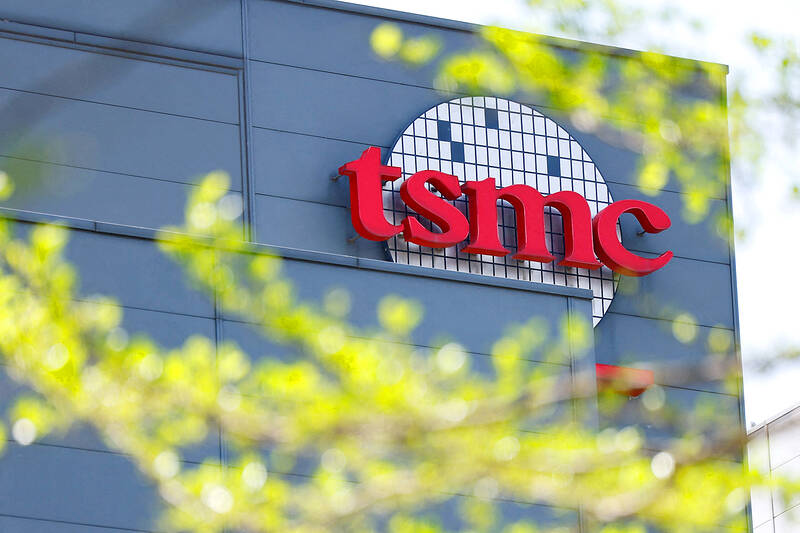Taiwan Semiconductor Manufacturing Co (TSMC, 台積電), the world’s largest contract chipmaker, has been listed as among the “100 Most Influential Companies” this year by Time magazine.
In releasing the list on Thursday, Time said that it highlights “businesses making an extraordinary impact around the world.”
The companies were categorized into five groups: pioneers, leaders, innovators, titans and disruptors.

Photo: Ann Wang, Reuters
Classifying TSMC as a titan, Time described the company as the “brain” behind everything from smartphones to data centers.
“Surging demand for its cutting-edge chips, which are optimized for tasks like machine learning and neural networks, helped TSMC beat analyst estimates in the first quarter of 2025,” the magazine said.
However, those chips place TSMC at the heart of the trade dispute between the US and China, making it “a focal point of geopolitical tension over [artificial intelligence’s] AI’s future,” Time said.
Other companies in the titan category included Berkshire Hathaway, led by chairman and chief executive officer Warren Buffett, streaming giant Netflix, and tech conglomerates Meta and Amazon.
ASML, a Dutch company that supplies photolithography systems to the semiconductor industry, was listed under the pioneer category.
US AI chip leader Nvidia and South Korean conglomerate Samsung Electronics were notably absent from this year’s Time list.
The list was compiled based on factors such as qualities, impact, innovation, ambition and success, after receiving suggestions and applications from various sectors, as well as input from the magazine’s contributors and correspondents around the world, the magazine said.

UNCERTAINTIES: Exports surged 34.1% and private investment grew 7.03% to outpace expectations in the first half, although US tariffs could stall momentum The Chung-Hua Institution for Economic Research (CIER, 中華經濟研究院) yesterday raised its GDP growth forecast to 3.05 percent this year on a robust first-half performance, but warned that US tariff threats and external uncertainty could stall momentum in the second half of the year. “The first half proved exceptionally strong, allowing room for optimism,” CIER president Lien Hsien-ming (連賢明) said. “But the growth momentum may slow moving forward due to US tariffs.” The tariff threat poses definite downside risks, although the scale of the impact remains unclear given the unpredictability of US President Donald Trump’s policies, Lien said. Despite the headwinds, Taiwan is likely

When Lika Megreladze was a child, life in her native western Georgian region of Guria revolved around tea. Her mother worked for decades as a scientist at the Soviet Union’s Institute of Tea and Subtropical Crops in the village of Anaseuli, Georgia, perfecting cultivation methods for a Georgian tea industry that supplied the bulk of the vast communist state’s brews. “When I was a child, this was only my mum’s workplace. Only later I realized that it was something big,” she said. Now, the institute lies abandoned. Yellowed papers are strewn around its decaying corridors, and a statue of Soviet founder Vladimir Lenin

UNIFYING OPPOSITION: Numerous companies have registered complaints over the potential levies, bringing together rival automakers in voicing their reservations US President Donald Trump is readying plans for industry-specific tariffs to kick in alongside his country-by-country duties in two weeks, ramping up his push to reshape the US’ standing in the global trading system by penalizing purchases from abroad. Administration officials could release details of Trump’s planned 50 percent duty on copper in the days before they are set to take effect on Friday next week, a person familiar with the matter said. That is the same date Trump’s “reciprocal” levies on products from more than 100 nations are slated to begin. Trump on Tuesday said that he is likely to impose tariffs

HELPING HAND: Approving the sale of H20s could give China the edge it needs to capture market share and become the global standard, a US representative said The US President Donald Trump administration’s decision allowing Nvidia Corp to resume shipments of its H20 artificial intelligence (AI) chips to China risks bolstering Beijing’s military capabilities and expanding its capacity to compete with the US, the head of the US House Select Committee on Strategic Competition Between the United States and the Chinese Communist Party said. “The H20, which is a cost-effective and powerful AI inference chip, far surpasses China’s indigenous capability and would therefore provide a substantial increase to China’s AI development,” committee chairman John Moolenaar, a Michigan Republican, said on Friday in a letter to US Secretary of